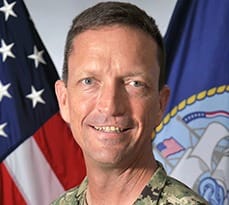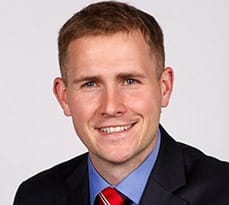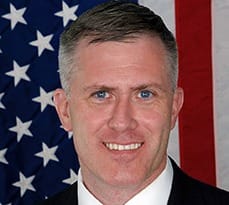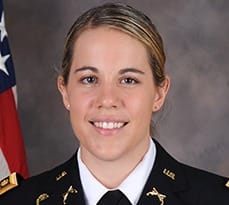Cambridge Judge Business School has attracted quite a few people from military backgrounds, and they’ve learned new approaches to leadership and team dynamics that go beyond the chain of command.
After six years as an officer in the US Navy, Ian Branum knew a thing or two about leadership and decision-making. But when he began his studies at Cambridge Judge Business School, he quickly learned what he didn’t know – particularly about inclusive decision-making that enhances leadership.

“As someone with a military background, I knew a lot about leadership and teams, but Cambridge altered my way of thinking – especially how I present ideas,” says Ian, a member of the Cambridge MBA Class of 1997/98. “In the Navy, for example, there is a belief that all briefs are either informational or decisional. But at Cambridge Judge I learned that while that may be so, more importantly all briefs are persuasive. It’s not about informing your boss or top-down decision making, it’s about persuading juniors, peers, and seniors sufficiently well that they willingly come on board with you.”
Ian is now chief solution architect at US software company Element Blue, based in Houston, Texas, and says that he’s applying his Cambridge Judge lessons in the Navy as a reservist.
“After 9/11 the reserves really cranked up and I’ve served roughly one day in four since. Much of what I learned on that MBA course is still relevant all these years later. I never realised how useful it would be, and for how long. I still subconsciously refer back to the course every day. I wouldn’t be the person I am without it.”
Ian is not alone among people in the military who have learned new approaches to leadership, organisation and team dynamics at Cambridge Judge.

US Marine Steven Cooney, who completed his Executive MBA at Cambridge Judge earlier this year, says the programme’s strategy elements have reshaped his thinking. “I have applied a lot of lessons around corporate governance and negotiation,” he says. “The course gives you the confidence and the clarity to know how to approach and tackle complex problems.”
Steven is currently on an exchange programme with the British armed forces, where those skills have helped him increase effective collaboration and communication between the US Marines and the UK Ministry of Defence.
“The course gives you the confidence and the clarity to know how to approach and tackle complex problems,” he says of the EMBA programme at Cambridge Judge. “It’s a combination of working in real-world, practical situations backed up with academic knowledge. It’s rigorous, and it’s challenging, but it needs to be. And it doesn’t just teach you, it encourages you to keep learning.”
A paper written by Steven recently won the Cambridge-McKinsey Risk Prize awarded by the Cambridge Centre for Risk Studies in conjunction with consulting firm McKinsey. The paper discussed how US railroads, which have long benefited from lucrative coal transport, need to adjust to changing energy patterns.

Philip Romanelli, who has long been a US Army Reserve officer, began his Cambridge MBA in 2002 but was called up for deployment in Iraq after his first term, returning to the MBA programme a year later. Since completing his MBA, he has held several senior civilian posts with the US government, including five years at the Pentagon as Deputy Chief of the Strategic Initiatives Group of the Secretary of the Army and, for the past year, as Deputy Garrison Commander of the US Army post in Ansbach, Germany.
“The Cambridge MBA was a fantastic opportunity to do something that enabled a shift, to take what I had done in a military background and to add business skills and a broader conceptual context,” he says. “I wouldn’t be where I am today without what I learned in Cambridge.
“In military life you’re often focused on tactical issues, execution and doing things right, rather than strategy or operations,” says Philip. “So the broader perspective I got in Cambridge was really important, both the organisational behaviour skills and also some of the softer skills which have really stuck with me. I also learned that business is really different overseas, as Cambridge has a genuine diversity in its student body. We as Americans can sometimes assume we have it right, and it was very illuminating to see that some of these other ways also work well, and may even be better.”

Major Heather Ritchey, an operations research and systems analyst in the US Army, came to Cambridge Judge to do an MPhil in Management Studies in 2004 after winning a Gates scholarship.
“It’s not just about the academic aspect of the course content,” says Heather. “The course I did changed the way I thought. It helped me to understand the Army – a big organisation – and to look at what it does and my role within it, from different perspectives. That’s hugely beneficial to enhancing the way you do your job. I was 22 at the time and was aware then that business exposure was an important tool, whether I stayed in or left the service.”
13 years on, that understanding has helped Heather in her most recent assignment as an assistant professor at the Military Police Corps in West Point, New York.
“Above everything, the Cambridge Judge experience taught me about team dynamics and how to lead them,” she says. “US higher education focuses on a breadth of knowledge. In the UK, students don’t have that breadth but instead they specialise, and have a far greater depth of understanding of individual subjects.
“Being in that cohort, I learned you can bat the ball to other people with different levels of experience and knowledge bases, and I learned how you can tie all those skills together so they complement each other. It taught me that every person – in a cohort, a business, an Army unit – brings their own unique skills, and I learned how to leverage and value every single person’s strength.”


